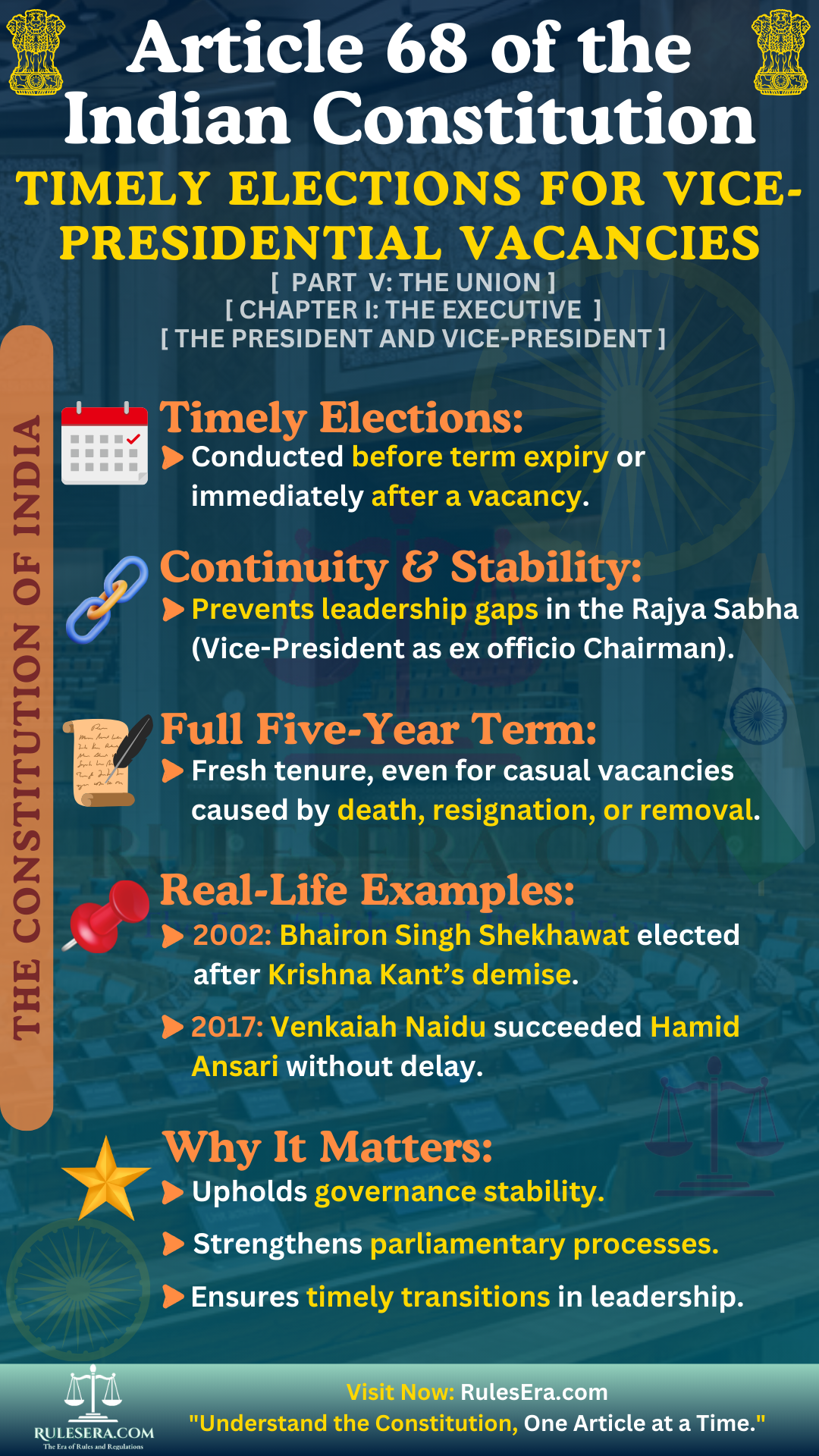Part V: The Union
Chapter I: The Executive
Article 68: Time of holding election to fill vacancy in the office of Vice-President

--- Original Article ---
(1) An election to fill a vacancy caused by the expiration of the term of office of Vice-President shall be completed before the expiration of the term.
(2) An election to fill a vacancy in the office of Vice-President occurring by reason of his death, resignation or removal, or otherwise shall be held as soon as possible after the occurrence of the vacancy, and the person elected to fill the vacancy shall, subject to the provisions of Article 67, be entitled to hold office for the full term of five years from the date on which he enters upon his office.
Article 68 - Explanation
Article 68 of the Constitution of India establishes the timeline and procedure for filling vacancies in the office of the Vice-President. The provision ensures continuity in the office by mandating timely elections either at the end of the Vice-President's term or in cases of unforeseen vacancies, such as death, resignation, or removal. This provision guarantees stability and prevents any prolonged gaps in leadership within the upper house of Parliament, the Rajya Sabha, where the Vice-President serves as the ex officio Chairman.
Clause Headings and Explanations:
Clause (1): Election to fill vacancy caused by expiration of term
This clause mandates that elections to fill the office of the Vice-President upon the completion of the incumbent’s term must be conducted before the end of that term. This ensures that there is no interruption in the functioning of the Vice-President’s duties, particularly as the ex officio Chairman of the Rajya Sabha. The intent behind this provision is to maintain seamless governance and uphold the integrity of the parliamentary system.
Clause (2): Election to fill casual vacancies
In case of a vacancy due to death, resignation, removal, or any other unforeseen reason, this clause states that an election must be held as soon as possible to fill the vacancy. Importantly, the newly elected Vice-President will serve a full term of five years from the date of assuming office, irrespective of how much of the previous Vice-President’s term was left. This provision ensures that the Vice-President enjoys a full tenure, facilitating stability and long-term planning in the role.
Amendments and Historical Significance:
Although no specific amendments have been made to Article 68, its importance has been highlighted during several presidential elections and vacancies in India's political history. For example, when Vice-President Krishna Kant passed away in 2002, the election to fill the vacancy was conducted swiftly, ensuring no prolonged absence in this crucial constitutional office.
Real-Life Examples:
- Krishna Kant (2002): The untimely death of Vice-President Krishna Kant in July 2002 left the office vacant. The election to fill the position was promptly held, and Bhairon Singh Shekhawat was elected as the Vice-President in August 2002, ensuring a smooth transition.
- Hamid Ansari (2017): In 2017, the Vice-Presidential election was completed before the expiration of Vice-President Hamid Ansari’s second term. Venkaiah Naidu was elected in a timely manner, showcasing the adherence to this constitutional provision.
Legislative Background
Article 68 of the Indian Constitution originated as clauses (5) and (6) of Article 55. During the Constitutional Assembly debates, discussions focused only on clauses (1) to (4) of Article 55, which took place on 28th and 29th December 1948, and 13th October 1949. Clauses (5) and (6) were not deliberated upon during these sessions. Subsequently, these clauses were reclassified and included as Article 68 in the final version of the Indian Constitution.
Debates and Deliberations:
During the Constitutional Assembly debates on Article 68, members discussed the importance of a timely election process for the Vice-President’s office. Prof. K. T. Shah emphasized that any vacancy should be filled promptly to ensure the smooth functioning of the executive branch, particularly given the Vice-President’s role as ex officio Chairman of the Rajya Sabha. He proposed stricter timelines for elections in case of unforeseen vacancies, highlighting the need for continuity in this key office.
Mr. Naziruddin Ahmad supported this view, urging that the Constitution should not permit any delays in filling such an important post. He stressed that the vacancy should not affect the legislative process, given the Vice-President’s dual role in Parliament.
Dr. B. R. Ambedkar argued that while the election process should indeed be timely, it should also allow enough time for thorough considerations and consultations, ensuring that the elected Vice-President is suited for the role. Ambedkar’s stance balanced the need for expediency with the importance of careful electoral deliberations.
Frequently Asked Questions (FAQs):
In case of the Vice-President’s death or resignation, an election is held as soon as possible to fill the vacancy, and the newly elected Vice-President serves a full term of five years from the date of assuming office.
For a regular term, the election must be completed before the expiration of the incumbent’s term. In case of an unexpected vacancy due to death, resignation, or removal, the election is held as soon as possible.
No, the newly elected Vice-President always serves a full term of five years, even if they were elected to fill a vacancy created mid-term.